Written by the Faculty of Science
In the study of science, a community is defined as an interacting collection of species in a common location. Here in the Faculty of Science, our students, profs, advisors, graduates, alumni, and staff, are the ones who define our community and make the university experience memorable and welcoming.
To show how incredible and inviting our Science community truly is, some of our current students have shared their experiences — here’s what they had to say.
Starting off on the right foot (or left, we don’t judge)
Orientation Week (or O-Week) is your initiation into the Faculty of Science and the University of Waterloo. It’s a week full of games, trophies, friendships, and our not-so-secret but oh-so-secret Secret Science Dance. This is where you’ll meet others in your program, upper-year students, and a whole cohort of future scientists that fill the air with amazing energy.
“My leaders were really energetic and outgoing, and really accepting. Everyone has the same interests as you which was weird but refreshing. I was screaming my head off the whole time,” says Maggie, an Honours Science student. “Everyone was excited — even the introverts.”
And for Divya, an international Science and Business co-op student from Qatar, Orientation was an important part of her introduction to Canada and Science. “It really sets you up to be in the community — sets you up for support, fun, events, and gives you so many memorable connections to your fellow students. Science has really become a home away from home for me.”
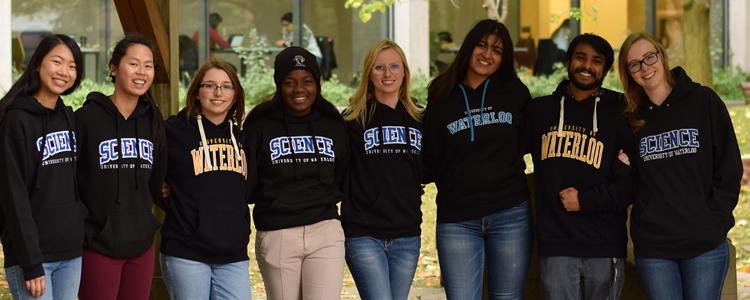
There is something so cool about super big nerds all coming together. And the leaders — they’d say ‘come talk to us anytime’ and they meant it! I’d see them on campus after orientation and they were still so willing to chat and help you out. I was so inspired that I became an orientation leader too.
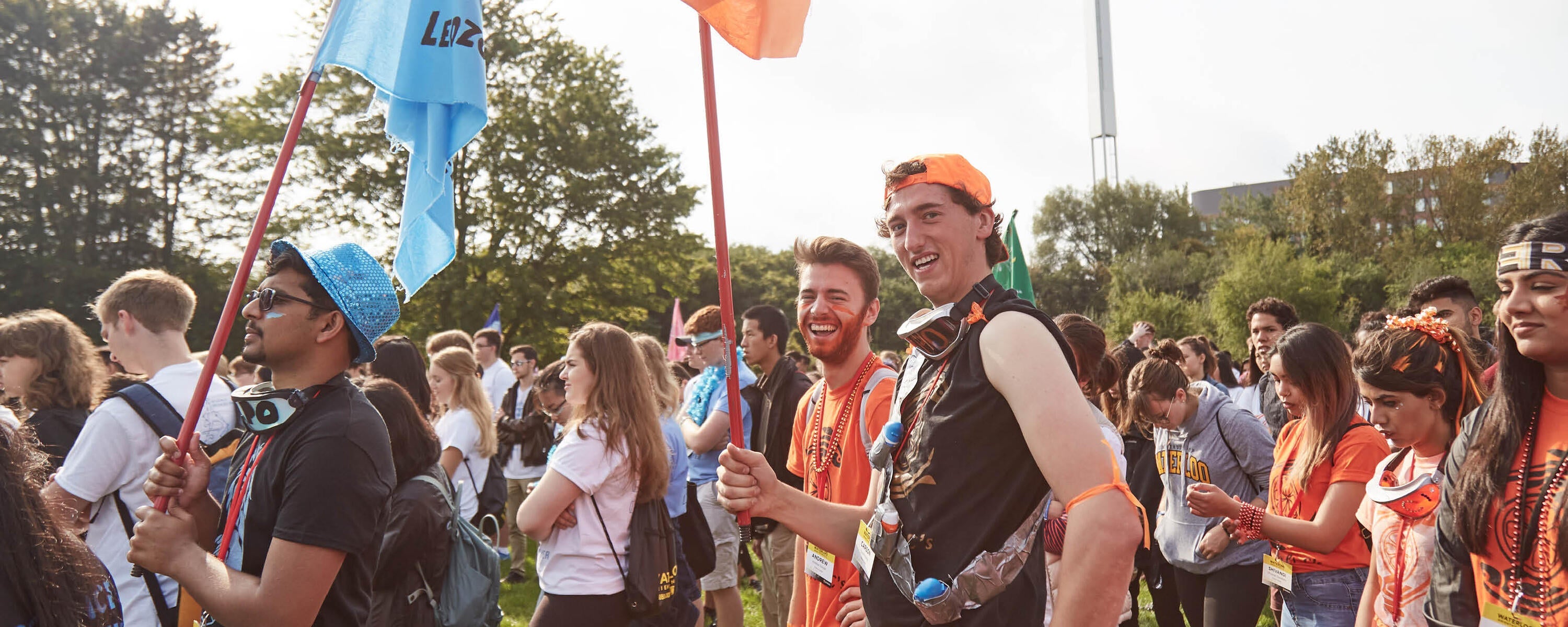
Carson, an Earth Sciences student, leads a group of first-year students during Orientation.
Everyone loves science here — no, really, it’s true
Imagine sitting at a patio on campus and you overhear students chatting enthusiastically about their yields and synthesis — and you realize your listening to two guys talking about organic chemistry.
“That’s when it hit me, we really are a bunch of future scientists,” says Defne, a Mathematical Physics co-op student. “If I hear people talk about acids while eating their lunch, somehow it makes the academic side of science so much more approachable and not as intimidating. I mean, when you’re around passionate people, it rubs off and you want to dive in with the same excitement with your classes and labs.”
Olivia found that these passionate scientists were super approachable too. “When you talk to your peers or ask questions, or even talk to your profs, they’re willing to help and give advice. And you can always find a study buddy.”
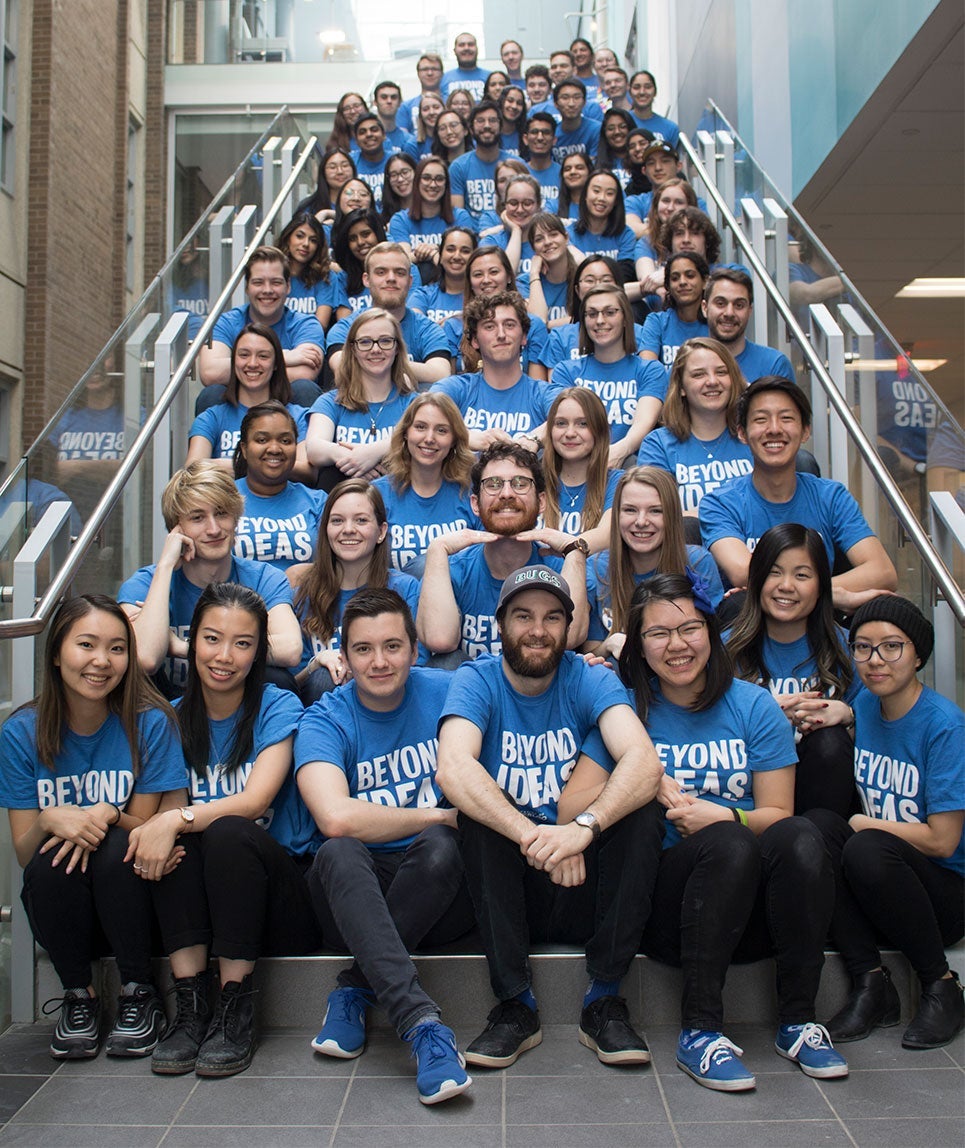
Science Ambassadors after an event.
Science Society lives up to its name
Another aspect of the Science community is Science Society (or SciSoc, as it’s known around campus): your student-run government that organizes academic events, non-academic events, and student activities. But it’s so much more than that. It’s a ridiculously welcoming group of students that branches out into seven clubs, each with their own room. Most clubs are in the Science Teaching Complex, down a hallway conveniently located next to the Starbucks (coincidence? We think not).
The clubs hallway has an open door policy. Everyone is welcome, including those outside of the Faculty of Science. Just walk into any room and you’ll usually find someone there. And if you’re a new face, they’ll make you feel extra welcome. Ariel recalls when she first walked into the Biology Undergraduate Society (BUGS for short) and Evan, an Environmental Science co-op student, encouraged her to enter. “I just thought wow, I really am a part of this community.” She didn’t just stop at BUGS — in her second year she ran into the Biochemistry club room because she was struggling with a lab report and cried “does anyone know anything about organic chemistry??!” It turns out that yes, many of those students were able to help her and she met one of her best friends that day.
Divya recalls how easy it was to enter a club. It didn’t matter if you were a Physics student or something unrelated to Biology, you could run into BUGS and be welcomed. “They’re not exclusive! Honestly, even non-science students stop by too — and they take extra time to make everything inclusive and accessible. Oh, and you’d often find leftover baked goods from the Coffee and Donut shop — that often came in handy between classes.”
Shelby, an Environmental Sciences co-op student, also recalls her friend forgetting her lab coat and goggles at home — and SciSoc had her back. “BUGS had spares so my friend could go to her lab. It was great!”
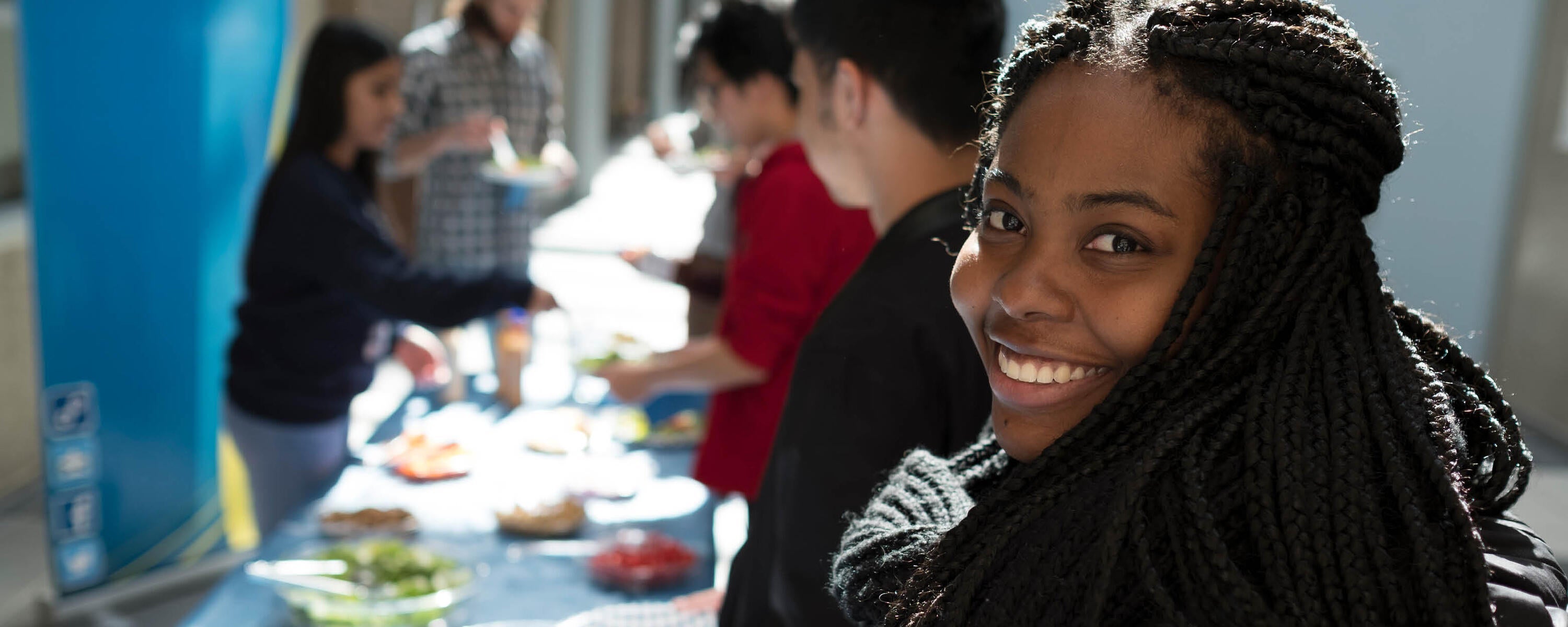
A student grabs a free salad during one of Science Society’s wellness events.
More than the sum of its parts
Not only will you make lifelong friends and be free to enjoy and celebrate science with other awesome scientists, you’ll also be in a supportive environment that wants to see you succeed with your goals.
This is especially true in your first year. For some, the transition from high school to university can be overwhelming. Maybe you selected courses that you no longer think match your goals, or maybe you find your program leans too heavy in a science you’re struggling with or no longer find interesting. That’s perfectly fine! Our advisors are happy to help.
I was struggling to wrap my head around the various courses I was taking — they were overwhelming and I wasn’t sure if they were aligned with my goals. My advisor asked if the course was worth it to me, and when I hesitated, she suggested I drop it and take another course in the summer term or at another time down the road. It was in that moment that I realized I can pursue my degree on my terms, at my own pace. I wasn’t locked into something that I wasn’t enjoying. You are the person in charge of your own destiny here.
Tiffany, a student in Honours Science, was struggling with her first-year physics course — it was an elective, and she wasn’t sure if physics was the right path for her. Tiffany’s friend suggested she see one of the first-year advisors in the Science Undergraduate Office. She was a bit nervous because she thought the advisor wouldn’t be supportive, but that couldn’t be further from the truth. “She was super understanding and suggested I drop physics and said I could also switch programs. She’s since checked in on me and even stops me in the hallway to ask how I’m doing.”
Olivia, an Earth Sciences co-op student, wasn’t sure if she needed help with selecting her courses — there were a few conflicts with what she was hoping to take but she thought she might be able to manage it on her own. However, she decided to see her academic advisor and was very glad she did. Her advisor helped identify how she could switch a few courses around and make it all work out better. “It was a great trick that I wouldn’t have been aware of if I hadn’t talked to him.”
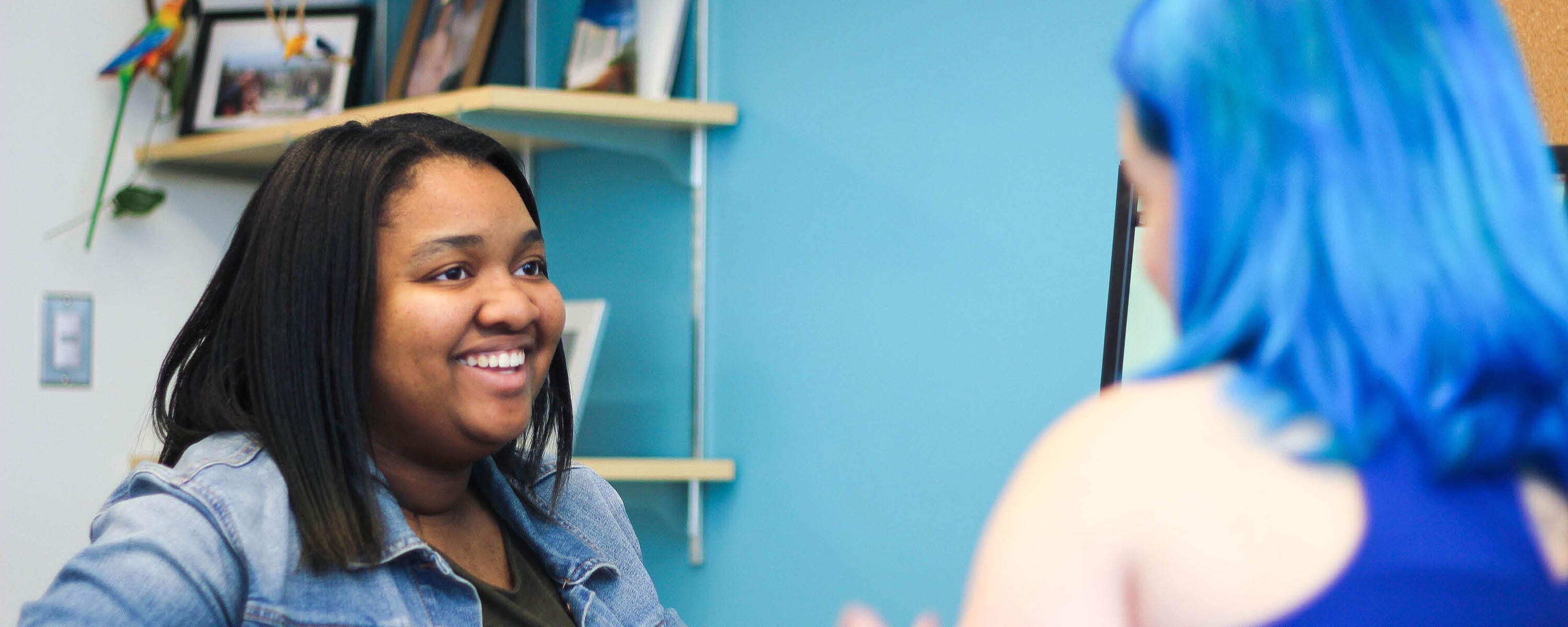
A student speaks with Priscila, one of our amazing advisors, in the Science Undergraduate Office to discuss switching programs.
Our community is your community
Our students are what makes us great in the Faculty of Science. Their enthusiasm and passion for science, their energy, welcoming spirit, and can-do attitude inspires everyone around them to be the best that they can be. We’re excited to welcome our students every year into this community — we hope these are memorable years that you’ll look back on with delight.
Welcome, future scientist.
Related articles

Grab your goggles: Science Orientation is coming
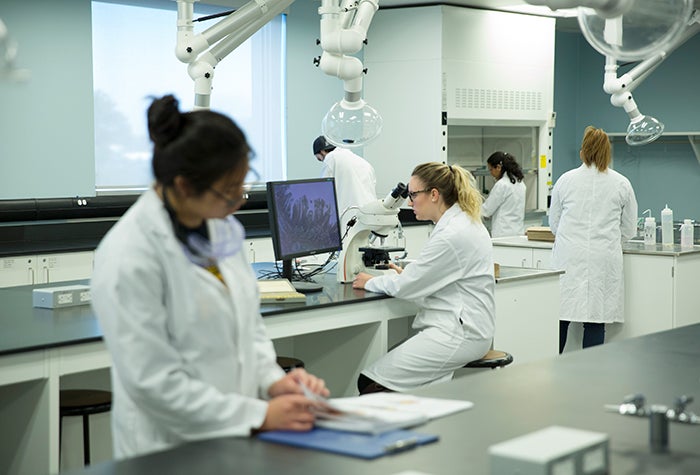
Labs — your next-level playground

Preparing for labs in university

